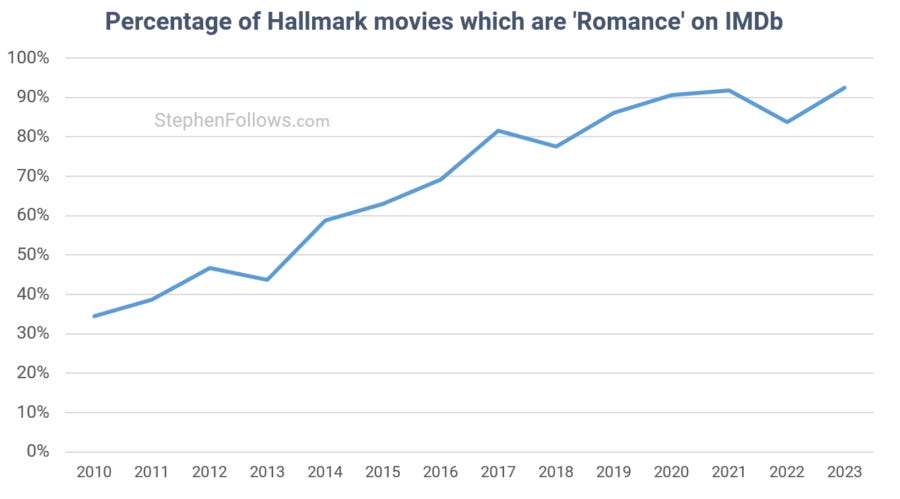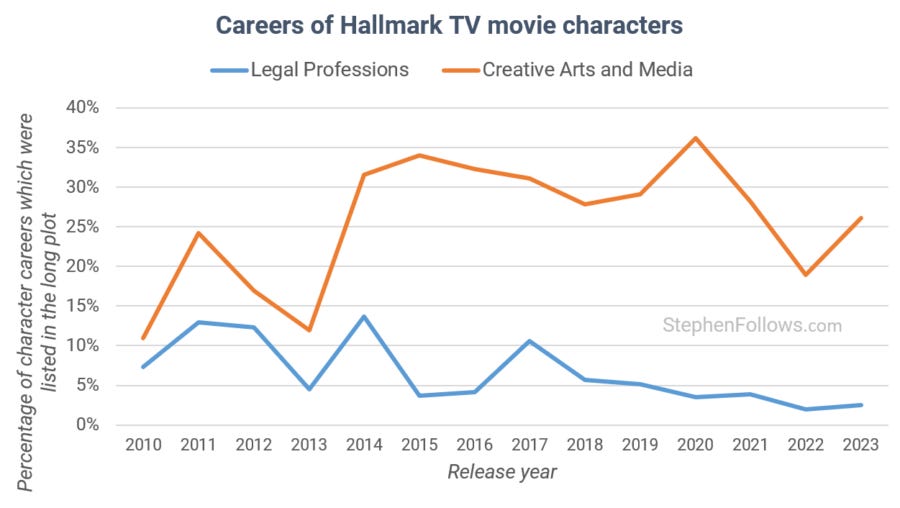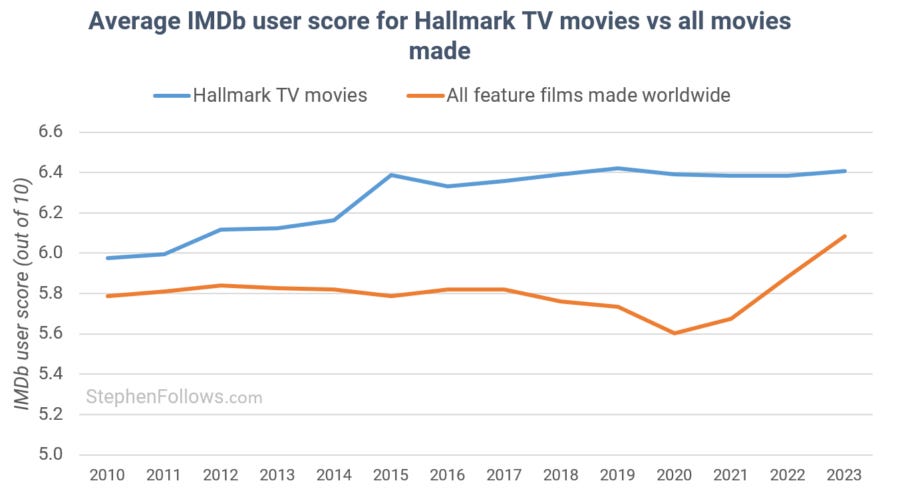What’s inside the Hallmark TV movie bible?
Inside the rules and numbers behind more than 800 Hallmark TV movies
In my previous article, I looked at the topic of Hallmark Christmas movies. It took me deep down the Hallmark rabbit hole, and I have to say, I thoroughly enjoyed the journey into schmaltzy, feel-good fare.
And I thought that’s there I would leave it. However, the article led to a number of fascinating conversations with professionals involved in the making of Hallmark movies. They shared all manner of details from inside the Hallmark movie-making machine, and so I wanted to share what I learned.
Hallmark has built a set of rules and guidelines they use to shape the kinds of movies they want to make and acquire. So we’re going to take a look at this movie bible and also see how many of the ideas can be reflected in the data with my dataset of 864 Hallmark TV movies made since 2000.
Below is a selection of key things from their internal playbook and from my own observations. The language and framing are mine, with all verbatim quotes from the Hallmark bible being presented in italics and speech marks.
1. Keep love light and true
The core of what Hallmark wants is described by them as “light romantic comedies with a heartwarming ending“. The Hallmark bible says
“This is always our A story. Our needs to have layers and depth, and we need to see a clear arc from her and from her love interest. How do they help each other to change for the better?“
“Our content is not sexual in nature at all (a kiss is enough to show the romance in our movies), and we usually save this moment for the end when our lead gets her fairytale ending.”
This strong preference seems to have built over time, with Hallmark doubling down on what resonates with their audience.
2. Make us believe in your characters
Hallmark has a narrowly defined character archetype they want to tell stories about. They feature:
“A strong female lead (early to mid-thirties)”
“Character setup is crucial for us -we want to know about their hopes, dreams, things that make our leads tick“
They have an easy-to-understand, aspirational profession, which, apparently, does not include acting: “We don’t like our female and male leads to be actors and actresses as their jobs in the script unless the whole concept revolves around that“.
When I crunched the numbers on the Hallmark movies in my database, I found that the most common jobs are that of lawyer, chef and teacher.
If we zoom out for the specific job title and look at the area in which they work, we can see that the creative arts rule the roost, accounting for 26% of all jobs by clearly defined characters in Hallmark TV movies.
3. Let structure guide thy narrative
Their ideal story structure is defined as:
“Script should be 105-110 pages typically“
“9 Act Structure“
“Act 1 is 23-25 pages“
“The other acts are shorter but should be generally consistent – 8-12 pages usually“
“Midpoint is at the middle of act 4“
“Acts 7/8 -needs to be the low point/breaking point before things get better“
“Act 9 is often 7-10 pages“
“Total runtime we aim for is 86:30 and then after we screen the producer’s cut internally, we will “typically take it down to 84:00 (with credits)“
Further story guidelines include:
“Want establishers at the top of the movie to set up the city or town.”
“We typically like a lot of banter between our leads as they’re getting to know one another.”
“Strong conflict drives the leads apart toward the end of the movie (only to get back together in Act 9).”
“Let funny/joke moments play out and don’t blow through them when editing when all is said and done”
“For any crying scenes, we don’t like too much crying. We like to see emotion and hold beats on those to play things up, but we don’t like to get too dramatic.”
“We love to see pets in our movies {and we have a cat and dog -the Happies -that can potentially be the animal talent). That being said, we have very strict pet dos and don’ts. They cannot be off their leashes or outdoor animals. They cannot ever look like they’re in danger of getting hurt or abused in any way.”
“We’re generally not fans of montages […] or slow motion.”
“We don’t like karaoke or singing scenes in our movies and no bowling.”
The desire to avoid bowling seems an odd one at first, but I guess it’s one of the things they’ve discovered over so many productions, which presents a challenge to either production or the creative.
The location being a feature of the plot is a growing trend for such movies. I was surprised to discover just how many such movies have the theme of returning to a hometown. Given the rise over the past decade, this must be a conscious choice on behalf of the execs at Hallmark.
4. Know thy audience
Hallmark defines their audience as “Women aged between 25 and 54″ and say “we don’t like to stray far from what we do. It’s kind of a ‘if it ain’t broke, don’t fix it’ mentality”.
It can be easy to be cynical about the quality of TV movies, especially when comparing them to epic, arthouse film festival darlings (well, not all), but this is an unfair comparison. Hallmark deeply understands their audience and knows how to consistently deliver what they want.
This is reflected in the IMDb audience scores for the movies, which are meaningfully higher than the average feature film. Over the past 14 years, Hallmark movies have got an average IMDb user score of 6.3 out of 10, whereas when we look at all movies made at just 5.9.
This is especially true in the core genres they seek to serve.
5. Honour the family, but don’t tell their tales
The Hallmark bible defines the content of their TV movies as “…very family friendly and PG/G in nature. A rule of thumb when watching our movies is you want to be able to watch with your 80-year-old grandmother and your 5-year-old niece/nephew“.
Further, guidance declares, “We don’t do cursing, dirty jokes, innuendos etc.” and “We can’t say the Lord’s name in vain“.
One detail that stuck out to me was that although Hallmark wants to appeal to family audiences and to stay ‘family friendly’ when it comes to objectionable content, they are losing interest in telling stories primarily around family dynamics.
6. Seasons are sacred
And probably one of the things they’re most famous for – Christmas is a BIG deal for them.
“Lean into the holiday/give leads a POV about the holiday (this is especially the case for Christmas. We like a lot of holiday traditional elements and, more importantly, to give our leads a strong point of view of the holiday).”
“If the movie is for a specific season (Valentine’s Day, Spring, Summer etc.) we like that season to almost feel like a character in the movie with lots of imagery.”
“We also like to see our characters doing lots of wintery/Christmassy things -ice skating, baking cookies, sledding, building snowmen, making snow angels, kissing under the mistletoe, hanging stockings, drinking hot chocolate, picking our or cutting down a Christmas tree, decorating the .house/tree with holiday decor etc.”
“For Christmas -we always need snow or the remnants of snow and lots of holiday decorations (in a tasteful way).”
If the movie is for a specific season (Valentine’s Day, Spring, Summer etc.) -we like that season to almost feel like a character in the movie with lots of imagery.
You can read more about Hallmark Christmas movies specifically here.
Note
I’ve been a bit loose with some of my wording for simplicity’s sake and because I know I have a wide range of readers, some very knowledgeable about the intricacies of the film industry and some who are new to the topic. So here is a little more on the ‘inside baseball’ of the Hallmark marketplace.
I have lumped all “Hallmark TV movies” together as if they have one route to market. In fact, Hallmark sources these titles in two ways. About three-quarters of them are bought or licensed from outside production companies, with Hallmark only making the remaining quarter in-house. They seem to spend more money than the latter group. The budgets for the licensed titles seem to be around half a million dollars or less, whereas their in-house productions sometimes go over $2 million.
Wanting to watch a feel-good movie might be a universal desire but the commercial market for these particular movies relies very heavily on the domestic audience. Their in-house productions are pretty much made for their own channel, with international sales bringing in a few hundred thousand dollars at most.
So, while it’s true to say that Hallmark isn’t making most of the movies directly, they are clearly the market-maker and principal buyer.
If anyone wants to look at a good case study of a company pumping out such movies, check out the work of MarVista Entertainment, who have over 700 titles under their belt.
The post What’s inside the Hallmark TV movie bible? appeared first on Stephen Follows.












How dreadful
Please hallmark stay to your family standards and keep "The way back home" clean and not bring in the "woke" agenda with Kat and Susanna.